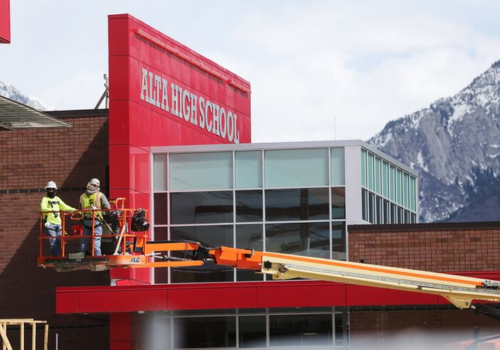
A newly released legislative audit has raised serious concerns about the Utah State Board of Education’s (USBE) ability to oversee and enforce building code compliance across K-12 public schools, identifying gaps that could jeopardize student safety and property protection.
The audit, presented Tuesday by the Office of the Legislative Auditor General to the Legislative Audit Subcommittee, found that although local school districts are responsible for code compliance, the state board has a statutory duty to verify inspections and enforce preconstruction requirements. However, auditors concluded that this critical role is not being fulfilled consistently.
“The impact of insufficient inspections and untrained building officials can materialize as a risk to school property and the life and safety of school building occupants,” the audit report warned.
According to the report, certified building inspectors uncovered compliance issues in recent projects that should not occur if local education agencies (LEAs) followed established building codes. The audit found that while LEAs are required to complete a USBE preconstruction checklist and adhere to certain enforcement mechanisms, the state board has reportedly “never used them.”
This lack of enforcement has resulted in widespread noncompliance, with many LEAs starting construction without fully meeting requirements. The audit noted: “USBE’s lack of timely processing of required permit submittals likely impacts its ability to enforce deadlines when the state board itself is not keeping up. Because of this situation, LEAs often proceed with construction before complying with rules.”
Auditors emphasized the importance of inspections for safety, adding: “Qualified inspections verify compliance with the state-adopted building codes, which exist to establish minimum standards for the protection of property and the safety of building occupants.”
The audit revealed that the state board is supposed to authorize permanent occupancy of school buildings by either issuing a certificate of occupancy or communicating code deficiencies. However, the current practice is ineffective: “The current process reportedly does not yield any information which would allow the state board to identify; it is essentially a rubber stamp.”
A single USBE construction specialist is charged with overseeing the entire system. According to the report, this individual told auditors he “lacks the tools to adequately enforce compliance.” Documents are currently managed manually via email and an outdated database, with no system in place to track or flag noncompliance.
“USBE’s document management system is ill equipped to efficiently manage the volume of monthly inspection reports and does not facilitate enforcement of noncompliance,” the report stated.
Independent inspectors and state officials have recommended the development of an online portal to manage construction documentation, a step auditors say would help fix systemic issues that stem from “years of neglect” and signal that construction oversight is not a board priority.
The report also questioned whether USBE is appropriately staffed to handle the responsibility: “USBE’s primary focus is not construction; while the state board employs one person with construction expertise to oversee this process, one position is reportedly insufficient to fulfill state requirements.”

In addition to structural oversight issues, the audit scrutinized procurement practices at one unnamed district that had hired the same general contractor for 18 school projects since 2014. The district only conducted two bid solicitations across those 11 years, raising questions about competitiveness and fairness. “Although we did not establish undue bias nor illegal procurement methods, the district’s practices exhibit the appearance of impropriety,” the audit stated.
“The general contractor that the district has almost exclusively used since at least 2014 appears to often offer services to the district for a much lower price than other bidders. However, the school district only retains recent bid documentation, making it difficult to entirely validate this claim,” the audit continued.
The most serious safety concern flagged was the improper construction of firewalls. “Multiple schools did not build required firewalls in compliance with code,” the report stated. “Firewalls are highly regulated because if a firewall fails, fires can spread more rapidly, increasing risk to property and building occupants.”
The audit offered a series of recommendations to improve compliance and transparency, including development of an online tracking system, improved training, a standardized cost reporting process, and clearer expectations for inspections and reviews.
In a written response, State Superintendent of Public Instruction Sydnee Dickson said the findings would be “referred to board leadership for consideration of involvement of the full board and next steps that will be taken to address the risks identified in the audit.” The board is expected to begin discussing the report by August 31.
During Tuesday’s meeting, Sen. Luz Escamilla, D-Salt Lake City, expressed concern about uncertified building officials working in Utah schools: “very problematic.” When she asked auditors if there were any consequences for failing to follow inspection rules, they responded that they were unaware of any enforcement mechanisms.
House Speaker Mike Schultz, R-Hooper, acknowledged that “the state school board having statutory-required compliance oversight over the construction of new schools — so criticism is valid if that’s not happening.” However, he questioned whether USBE was the right body to oversee school construction: “But I do question whether or not USBE should have oversight.”
“I do think that is the way to make sure that the building codes are followed. I think that’s what needs to happen and should be happening,” Schultz added.
Scott Jones, Deputy Superintendent of Operations at USBE, said the board welcomed the audit. “It’s taken some time, and I think the time is well worth it, because we are at a decisive point in the future of oversight of school construction,” he said. Jones also pointed to staffing and logistical hurdles, but said the board is open to collaboration: “We are agreeable to working with the Legislature to optimize public education in Utah.”
Originally reported by Jason Swensen in Deseret News.